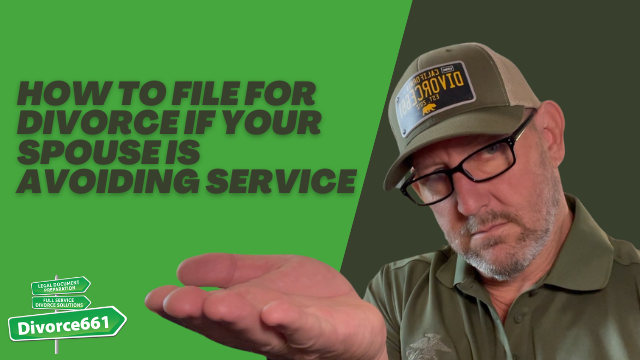How to File for Divorce If Your Spouse Is Avoiding Service
Getting a divorce can be challenging, especially if your spouse is evading service. You might feel stuck, but there are ways to move forward. In California, the process of serving your spouse with divorce papers is critical, but what happens when they refuse to accept them? Let’s break down your options and the steps you can take to ensure your divorce proceeds smoothly.
Understanding the Importance of Service
To initiate a divorce, one spouse must file a petition and serve the other with divorce papers. This process is not just a formality; it is a legal requirement that ensures both parties are aware of the proceedings. If your spouse is avoiding service by not answering the door or refusing to accept the paperwork, it can complicate matters.
However, California law provides alternative options for serving divorce papers. If you’ve made reasonable attempts to serve your spouse without success, you can request substitute service or even service by publication. This allows the court to move forward with your case without traditional personal service.
What to Do When Your Spouse Refuses to Be Served
If your spouse is actively dodging service, you need to document your attempts. Here’s how:
- Document Attempts: Keep a log of each attempt to serve your spouse. Note dates, times, and any interactions (or lack thereof).
- Hire a Process Server: Consider hiring a professional process server who is experienced in locating and serving evasive individuals.
In one case, we had a client whose spouse was hiding inside and refusing to answer the door. After several documented failed attempts, we filed a motion for substitute service and received approval to serve the spouse by mail and posting. This allowed the divorce to proceed without delays.
Substitute Service Explained
Substitute service is a legal method that allows you to serve your spouse in alternative ways when traditional service fails. Here’s how it works:
- Service by Mail: If approved, you can send the divorce papers to your spouse via certified mail. This method requires proof that your spouse received the documents.
- Service by Posting: You may also post the documents at your spouse’s residence. This typically involves attaching the paperwork to their front door.
To request substitute service, you’ll need to file a motion with the court detailing your attempts to serve your spouse. The court will review your documentation and, if satisfied, grant permission for alternative service.
Service by Publication
If all else fails, you can request service by publication. This is generally considered a last resort and requires court approval. Here’s how you can go about it:
- File a Motion: You’ll need to file a motion with the court explaining why you cannot serve your spouse through traditional means.
- Publish a Notice: If the court approves your request, you will need to publish a notice in a local newspaper for a specified period. This notice should inform your spouse of the divorce proceedings and how they can respond.
Keep in mind that service by publication is typically limited to certain matters, such as the divorce petition and legal decision-making. Issues like child support or property division often require personal jurisdiction, meaning your spouse must be served directly.
Finalizing the Divorce by Default
If your spouse continues to avoid service, you may be able to finalize the divorce by default. Here’s how it works:
- File for Default: After successfully serving your spouse through an alternative method, you can file for a default judgment if they do not respond within the required timeframe.
- Proceed with the Divorce: The court can then issue a divorce decree based on the terms you propose, without your spouse’s input.
It’s crucial to follow all legal procedures to ensure the default judgment is valid. If you don’t comply with court rules, your divorce could be delayed or dismissed.
Why Choose Divorce661?
At Divorce661, we specialize in navigating the complexities of divorce, especially when service issues arise. Here’s what we offer:
- Expert Guidance: We guide you through every step of the process, including preparing the necessary declarations and motions for court approval.
- Flat-Fee Pricing: Our transparent pricing model means you won’t encounter any hidden fees.
- Remote Service: We handle everything from start to finish, making the process as smooth as possible.
If your spouse is avoiding service, don’t hesitate to reach out. Visit Divorce661.com for a free consultation. We’re here to help you navigate these challenges and keep your divorce moving forward.
Real Client Stories
Our experience is backed by real client stories. One client had a spouse who consistently avoided service. After documenting multiple attempts, we filed for substitute service and were granted approval. This allowed them to move forward with their divorce without unnecessary delays.
These kinds of challenges are not uncommon, and with the right legal support, you can overcome them. Remember, you are not alone in this process.
Conclusion
Filing for divorce when your spouse is avoiding service may seem daunting, but it’s entirely manageable with the right approach. Document your attempts, explore alternative service options, and consider seeking professional guidance to ensure your rights are protected. Don’t let your spouse’s evasiveness keep you from moving on with your life.
For personalized assistance tailored to your situation, contact Divorce661 today. Together, we can navigate the complexities of divorce and help you achieve a resolution.







